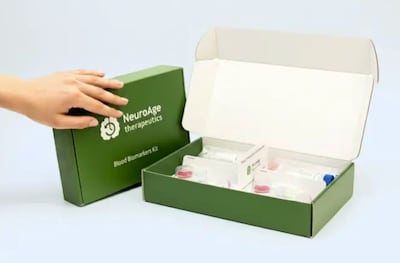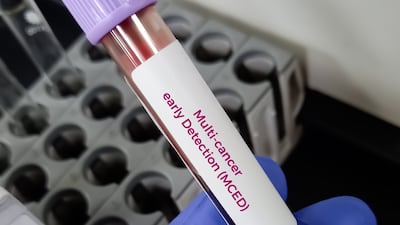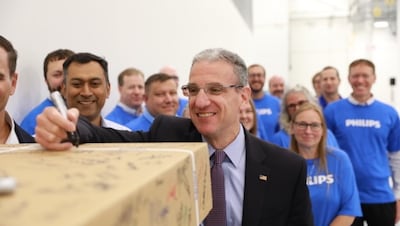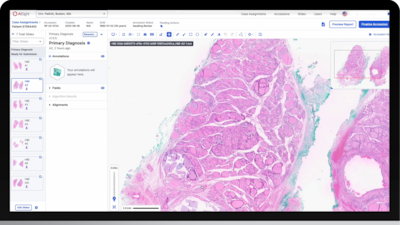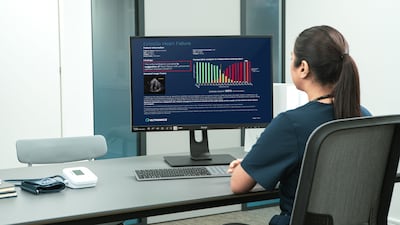Diagnostic Imaging
Atul Gupta, MD and CMO of Royal Philips’ Diagnosis & Treatment business, shares his views about potential developments in imaging and wider medtech in 2026 and the value of AI. He warns that clinicians will not adopt AI they don’t trust, understand or find helpful in real-world conditions.
MIT-scientist turned entrepreneur Christin Glorioso founded start-up NeuroAge Therapeutics to reverse brain aging and fight dementia.
AdvaMed Backs Bill That Would Create ‘Consistent’ Reimbursement Pathway For Algorithm-Based Services
Pending legislation in the US House of Representatives would allow Medicare patients to benefit from some of the latest and most innovative technologies. The bipartisan bill would establish a clear pathway for reimbursement for algorithm-based healthcare services approved by the FDA.
In September, the US FDA asked the public to weigh in on how AI-enabled medical devices perform in real-world settings. With the comment period now closed, the agency has heard back from dozens of stakeholders on how the agency can use clinical outcomes to better understand these devices.
Medtech funding in 2025 sees a trend of fewer, yet larger deals with total funding of $3.6bn in Q1, $2.6bn in Q2 and $2.9bn in Q3, said LSI’s Nick Talamantes. In 2026, he expects a continued investor focus on more mature firms in areas of oncology, cardiology and neurology.
A recent study demonstrates that certain types of blood-based tests that screen for multiple cancers at once have the potential to flip the script on cancer diagnoses, including some of the deadliest types.
At the MedTech Conference, the CEOs of Stryker, Hologic and Insulet said during a panel AI is now central to their business strategies, from creating new medical devices to streamlining workflows and administrative tasks. Stryker’s CEO Kevin Lobo plans a business unit focused on AI-enabled tech.
Insurance firm UnitedHealth is facing allegations the company intentionally used an unreliable PAD screening method to increase its reimbursements under Medicare Advantage. Semler Scientific and Bard, which respectively made and manufactured the products in question, settled related cases for $37m.
Roche’s scanners have been integrated with PathAI’s AISight Dx system. The system’s FDA-cleared PCCP allows new components to be validated and integrated without additional FDA clearance. Eric Walk, chief medical officer, hints at future biopharma companion diagnostic collaborations.
Cloud services accounted for 85% of Sectra’s imaging IT solutions business in 2024-25, and the Swedish medical diagnostic imaging and IT for precision medicine company is further expanding its digital healthcare and AI coverage in the UK, wider Europe and US.
Roche Diagnostics, Intuitive Surgical, Abbott and Edwards Lifesciences all acknowledge tariff headwinds, but stress preparedness, resilience and mitigation. Below is look at how management framed the impact in Q1 vs Q2 earnings calls.
Philips says the expansion of its facility in Reedsville, PA, will not only boost its capacity to produce AI-enabled ultrasounds that are used in hospitals across the US but will also create 120 well-paying jobs.
The US FDA has authorized around 107 devices with Predetermined Change Control Plans in place, with PathAI's AISight Dx digital pathology image management system one of the latest. Medtech Insight talks to Eric Walk, chief medical officer, to find out about the process and its benefits.
Among early cancer screening tests, SpotitEarly stands out by combining dogs’ superior sense of smell with machine learning. SpotitEarly plans two US clinical trials for breast and lung cancer aiming to seek FDA clearance, but needs more funding to support clinical development and commercialization.
Ultromics has secured $55m in Series C funding to advance its AI tool, EchoGo, which detects undiagnosed heart failure. The company's focus on diseases with available treatments resonated with investors.
Siemens Healthineers anticipates €400m-€500m tariff impact by 2026 but says it will mitigate losses through structural changes and pricing. Despite a revenue decline in diagnostics due to China’s VBP, diagnostics transformation activities, including cutting product, were “successful."
Pending legislation seeks to address what the sponsors argue is a lack of transparency in medical billing. If enacted, the bill would provide patients with the costs of procedures and medications before receiving them. A data collection expert discusses what the bill could mean for patients.
A new MRI scanner developed by a team of scientists working with the National Institutes of Health marks a milestone in understanding the complexities of the human brain. Andrea Beckel-Mitchener with the NIH Brain Initiative discusses the significance of this potentially game-changing device.
Agent drug coated balloon, Watchman product sales, and electrophysiology (EP) business unit growth offset Acurate discontinuation and tariff headwinds. CEO Michael Mahoney shouted out coronary therapies business and answered questions on CMS proposed Ambulatory Surgical Center codes.
The Cancer Research Horizons Innovation Awards took place on July 10. Medtech Insight spoke to nominees for the women’s entrepreneur of the year award: Mireia Crispin-Ortuzar, CEO of 52 North Health; Anita Grigoriadis, CEO of PharosAI; and Maria Giovanna Lizio, Founder of WILD-Imaging Technology.


